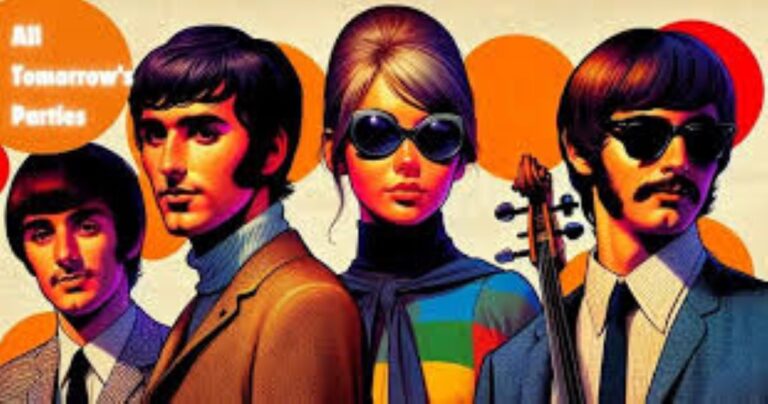“All Tomorrow’s Parties Meaning” is a phrase that evokes a sense of anticipation and curiosity. Originating from various cultural sources, including literature and music, it holds diverse meanings depending on the context in which it is used. This article delves into the historical and contemporary significance of “All Tomorrow’s Parties,” exploring its origins, cultural impact, and various interpretations.
Historical Origins and Cultural Significance
The phrase “All Tomorrow’s Parties” first gained prominence through its use in literature and music. Its origins can be traced back to the world of literature and the avant-garde artistic movement of the mid-20th century.
1. Literature: William Gibson and the Dystopian Vision
In William Gibson’s seminal 1984 novel Neuromancer, the phrase is emblematic of a futuristic dystopia. The novel, a cornerstone of the cyberpunk genre, explores themes of technology, artificial intelligence, and societal fragmentation. Gibson’s use of the phrase reflects the novel’s exploration of a future where the boundaries between human and machine are increasingly blurred.
The phrase encapsulates the novel’s underlying theme of technological determinism—the idea that technology shapes the future in profound and sometimes unsettling ways. The phrase suggests a sense of inevitability about the future and the parties or events that it will bring.
2. Music: The Velvet Underground and the Art of Ambiguity
The phrase also gained cultural prominence through The Velvet Underground’s 1967 song “All Tomorrow’s Parties.” Written by Lou Reed, the song is a reflection on the nature of celebrity and the transient nature of fame. Reed’s lyrics convey a sense of disillusionment with the superficiality of societal norms and the fleeting nature of success.
The Velvet Underground, known for their avant-garde approach to music and lyrics, used the phrase to critique the commodification of culture and the hollowness of societal expectations. The song captures a sense of melancholy and resignation, highlighting the impermanence of success and the superficiality of societal celebrations.
3. Art and Avant-Garde Movements
The phrase also found its way into the world of art, particularly within the avant-garde movements of the 20th century. Artists like Andy Warhol and his contemporaries explored themes of fame, consumerism, and the ephemeral nature of art. The phrase “All Tomorrow’s Parties” fits well with these themes, reflecting a critique of consumer culture and the fleeting nature of artistic success.
Warhol’s work, characterized by its focus on celebrity culture and consumerism, resonates with the phrase’s exploration of the transient nature of societal celebrations and the impact of media on public perception.
Contemporary Interpretations and Uses
In contemporary times, “All Tomorrow’s Parties” continues to inspire a range of interpretations and uses, from music and film to philosophical and social commentary.
1. Music and Popular Culture
In modern music, the phrase has been referenced and reinterpreted by various artists, reflecting its ongoing cultural relevance. The phrase’s use in contemporary music often continues the themes of disillusionment and critique of societal norms, reflecting the evolving nature of cultural criticism.
For instance, the phrase has been used by bands and artists to express themes of uncertainty and existential contemplation. Its association with avant-garde and countercultural movements continues to influence contemporary artists who seek to challenge conventional norms and explore new artistic expressions.
2. Philosophical and Existential Reflections
The phrase “All Tomorrow’s Parties” also resonates with philosophical and existential themes. It raises questions about the nature of time, the inevitability of change, and the human condition’s transient nature. Philosophers and thinkers have used the phrase to explore concepts related to the future, anticipation, and the impermanence of human endeavors.
In existential philosophy, the phrase can be seen as a reflection on the futility of human efforts and the inevitability of change. It challenges individuals to confront the uncertainties of the future and the ephemeral nature of their own pursuits.
3. Social and Cultural Commentary All Tomorrow’s Parties Meaning
In social and cultural contexts, “All Tomorrow’s Parties” serves as a critique of contemporary culture’s focus on immediate gratification and superficiality. It reflects a growing awareness of the impact of consumerism and media on societal values and behaviors.
Critics and commentators use the phrase to highlight the contrast between genuine cultural experiences and the commodified, fleeting nature of modern celebrations. It serves as a reminder of the importance of authentic experiences and meaningful connections in a world increasingly driven by consumerist and media-driven influences.
Conclusion
“All Tomorrow’s Parties Meaning” is a phrase rich with historical, cultural, and philosophical significance. From its origins in literature and music to its contemporary uses and interpretations, it encapsulates themes of anticipation, impermanence, and critique of societal norms. Its ongoing relevance reflects the complexities of modern life and the enduring quest for meaning in a rapidly changing world. Whether through the lens of cyberpunk fiction, avant-garde music, or existential philosophy, the phrase invites us to reflect on the nature of the future and the significance of our own celebrations and pursuits. As we navigate the uncertainties of tomorrow, “All Tomorrow’s Parties” serves as a poignant reminder of the transient nature of our endeavors and the ever-present possibility of cha

